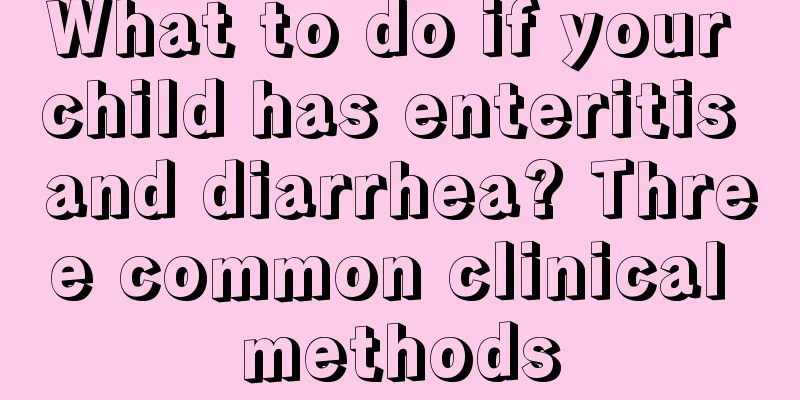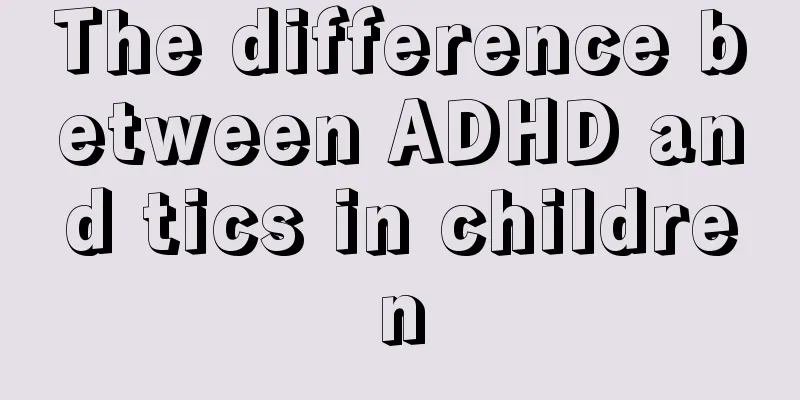What to do if your child has enteritis and diarrhea? Three common clinical methods

|
Enteritis is a common disease in children. In life, when a child suffers from enteritis, parents should take him to the doctor for treatment as soon as possible. Generally speaking, if a child suffers from frequent diarrhea, parents should be careful that it may be related to enteritis after ruling out factors such as diet. So, what should we do if our children have enteritis and diarrhea? Pathogen treatment Viral enteritis generally does not require pathogen treatment and can heal on its own. Antibiotics are generally not used for enterotoxigenic bacterial enteritis. For invasive bacterial enteritis, it is best to select antibiotics based on the results of bacterial drug sensitivity tests. When suffering from bacillary dysentery, because Shigella dysenteriae is widely resistant to commonly used antibiotics, co-trimoxazole (cotrimoxazole), pipemidic acid, gentamicin, amikacin, etc. can generally be used. Campylobacter jejuni enteritis can be treated with erythromycin, gentamicin, chloramphenicol, etc. Yersinia enterocolitica enteritis is generally treated with gentamicin, kanamycin, co-trimoxazole, tetracycline, chloramphenicol, etc. Patients with mild Salmonella enteritis may not need antibiotics, while patients with severe cases can use chloramphenicol or trimethoprim-sulfamethoxazole. Invasive Escherichia coli enteritis can be treated with neomycin, colistin and gentamicin with good results. Amoebic dysentery, enteritis caused by Giardia lamblia and Trichomonas can be treated with metronidazole (Flagyl). Schistosomiasis can be treated with praziquantel. Oral nystatin is effective in treating Candida albicans enteritis. Patients with systemic fungal infection need to be treated with amphotericin B. Fluid replacement and correction of electrolyte and acidosis For those with mild dehydration and not severe vomiting, oral rehydration can be given. The WHO recommended oral solution formula is 3.5g sodium chloride, 2.5g sodium bicarbonate, 1.5g potassium chloride, 20g glucose or 40g sucrose, added to 1000ml water. For patients with severe dehydration or vomiting, normal saline, isotonic sodium bicarbonate and potassium chloride solutions, and glucose can be given intravenously. Drugs that reduce intestinal motility and secretion Atropine, belladonna, and propantheline can be used in small amounts to reduce intestinal motility, relieve pain, and stop diarrhea. Chlorpromazine can also be used. It has a sedative effect and can inhibit excessive secretion of intestinal mucosa caused by enterotoxins, thereby reducing the frequency and amount of bowel movements. |
<<: What is the reason for the black spots under the child's eyes? Is it caused by sleep?
>>: What should I do if my child has rough skin?
Recommend
What to do if your baby develops a rash after the fever subsides
The situation where a baby develops a rash on his...
What cup is good for babies to drink water?
When giving babies water, many parents always fin...
What should I do if my baby has a poor appetite in summer?
In the summer, it is very hot and many people fee...
What are the symptoms of precocious puberty in children?
Nowadays, more and more children are prone to pre...
What can’t mothers eat when their baby has diarrhea? Young women are looking forward to it
Babies are prone to diarrhea. If they are still b...
One-year-old baby with allergic rhinitis
It is not a big deal for adults to have rhinitis,...
Why do children urinate frequently?
Adults may suffer from various urinary tract dise...
How much milk is best for a one and a half year old baby to drink every day?
We all know that drinking milk is something that ...
Causes and treatment of baby synovitis
I believe everyone must be very familiar with dis...
Is it normal for a two year old to not be able to speak?
Is it normal for a two year old to not be able to...
What is the reason for the white spots on the child's fingernails?
There are many reasons for the appearance of whit...
What are the requirements for the baby's turning over time?
Newborns are the most vulnerable group that deser...
The child has a fever but no other symptoms
Fever is a common symptom in daily life for many ...
Children have fever and herpes in their mouth
Children's immune systems are much weaker tha...
Does having encephalitis affect intelligence?
Every time the season changes, the flu starts to ...









